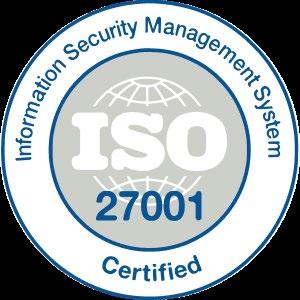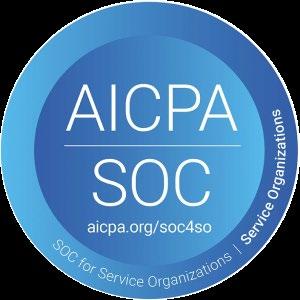
Welcome to risr/’s first customer newsletter, featuring global updates and the latest innovations from risr/




Welcome to risr/’s first customer newsletter, featuring global updates and the latest innovations from risr/



As we embark on 2025, we are proud to celebrate an incredible milestone at risr/ - our 25th anniversary. Your support and collaboration over the last 25 years has been at the heart of everything we’ve achieved. To mark this occasion, we’re delighted to introduce a new initiative for our valued customers: a customer magazine that is centred around connecting, sharing, and helping bring the risr/ community together on important and relevant topics, maximising the value of the risr/ products and our global customer engagement.
Within these pages, you’ll find a wealth of valuable content. From inspiring case studies shared by fellow risr/ organisations to details about our upcoming webinars, customer events, and the latest advancements in risr/ technology to support the future of assessment for learning.
We hope you enjoy this first edition and find it both engaging and informative. If you have any suggestions for future issues, please don’t hesitate to contact your account manager—we’d love to hear from you.
Thank you once again for your continued support and trust in risr/. Your partnership has been instrumental in helping us reach this remarkable milestone, and we look forward to what the future holds as we continue to improve collaboration, service value and share educational, operational and user experience insights together.

Paul Glover Chief Operating Officer
Our aim is to help you get the most out of the risr/ platform. Your ARM is your go-to guide, helping you maximise risr/ products to meet your goals. From day one, we support you through onboarding, regular check-ins, and any queries. We collaborate with risr/ teams to ensure your feedback is heard, issues are resolved quickly, and continuous improvements keep coming.
Claire Simmons
UK & Europe


I’m an experienced Account and Relationship Manager with over 15 years in SaaS and membership relations. I focus on understanding my clients’ needs and delivering tailored solutions that enhance satisfaction and loyalty. Based in Kent with my partner and our two young children, I spend much of my free time keeping them entertained and out of mischief!
email: Claire.Simmons@risr.global
Connect on LinkedIn
Dannielle Murphy
UK & Europe

I am a detail-oriented Account and Relationship Manager, passionate about building relationships and streamlining processes to improve efficiency. With expertise in platforms like Monday.com, I specialise in optimising workflows and supporting business growth, particularly in the Irish market. Originally from a small town in Australia, I’ve lived in Ireland, the U.S., and now South East London. Outside work, I juggle a busy family life with my three children— Aiden (10), Alannah (8), and Oscar (5)—ensuring there’s never a dull moment!
email: Dannielle@risr.global
Connect on LinkedIn
Richard Leith
UK & Europe

I have 15 years’ experience in account management within SaaS, including five years in the HE and FE sectors. I believe in building lasting, mutually beneficial customer relationships and have a strong interest in technological advancements. Based just outside Cambridge with my wife and two children, I’m a keen but average golfer, a former semi-professional rugby player, and now coach my son’s under-7s football team.
email: Richard.Leith@risr.global
Connect on LinkedIn
Tad Chapman
UK & Europe

With 13 years’ experience in skills and workforce development, I specialise in delivering innovative, sustainable training and assessment solutions. At risr/, I provide expertise on the vocational education market, drawing on my leadership of a leading EPAO across multiple industries. Passionate about corporate sustainability, I led an award-winning strategy and am currently studying for a Diploma in Business Sustainability.
email: Tad@risr.global
Connect on LinkedIn
For information on your Account Manager, contact info@risr.global
Join us in-person at Convene 133 Houndsditch, London 10 October | 10:00 - 16:00 GMT | Central London REGISTER
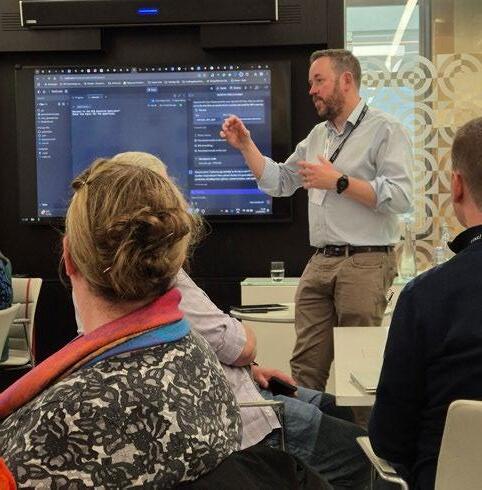


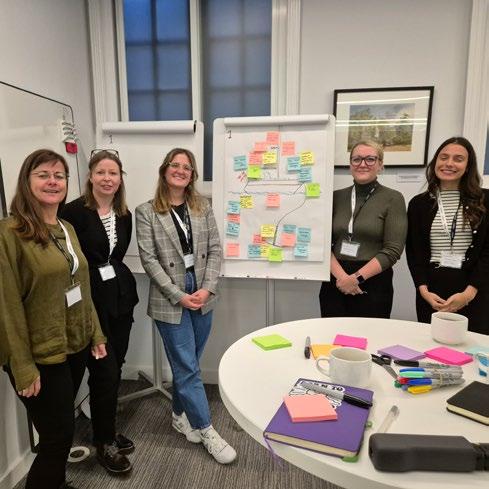
Building on the success of the 2024 risr/assess Community Day, we are thrilled to announce an even bigger and better community event for 2025! Open to all module users, this exciting gathering will feature:
• Networking opportunities to connect, collaborate, and share insights with fellow attendees.
• Updates on our latest product developments, keeping you at the forefront of innovation.
• Engaging discussions and sessions tackling the key topics shaping our community.
• The full programme will be unveiled in March 2025, and we can’t wait to welcome you.
100% of 2024 attendees rated their overall experience as good or excellent!
For more information please contact vic@risr.global
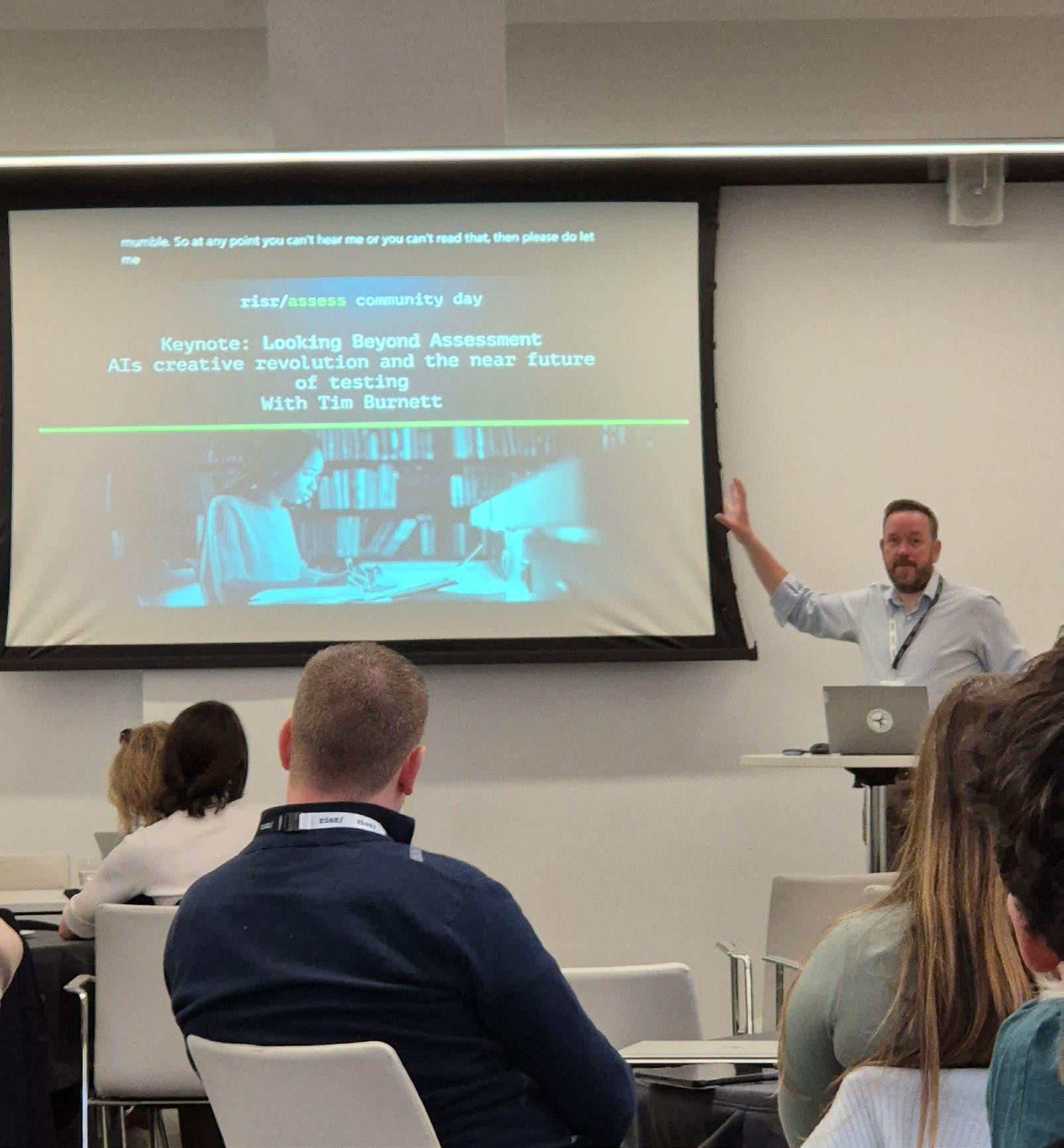

Interview with Keean Schupke, Chief Technology Officer
The ‘boom’ in popularity of artificial intelligence (AI), since ChatGPT broke onto the scene in November 2022, has encouraged many to be more openminded about how AI can augment their work. In assessment, it’s progressed the conversation about how we can collectively improve traditional teaching, learning and examination practices for the better.
To date, much of the discussion on the topic of AI in assessment has broadly focused on preventing its use as a cheating aid. However, it’s important that we don’t blinker ourselves and instead realise that the integration of AI into healthcare assessment actually offers numerous opportunities for enhancing various aspects of the assessment process.
Firstly, AI has the potential to help us to dive into the taxonomy of subjects, aiding in data tagging and a more efficient categorisation of learning materials. With more effectual tagging of these materials, the creation of assessments could be much quicker. If we can group and break down knowledge, to ensure we’ve covered all the necessary items from a specific area, then we’re certifying that students are examined fairly based on the entire breadth of necessary knowledge areas.
For example, a tutor creating a formative ‘popquiz’ style assessment might select five random AI-generated questions from the learning outcomes of lectures 1-3 of their course on ‘Anatomy 101’. This provides a
notable increase in the efficacy of the tutor’s limited resources and ensures a random, yet comprehensive, assessment of a student’s knowledge.
What’s more, the recent introduction of the Medical Licensing Agreement (MLA), which seeks to improve fairness and consistency in how prospective doctors are tested prior to joining the medical register, will bring with it more stringent curriculum requirements. This underpins the need for more efficient ‘tagging’ and clearly mapped curriculums to aid with the creation of more clearly defined assessment objectives and learning outcomes – an area where AI can excel.
Marking represents another area ripe for an infusion of AI. While the evaluation of longer-form answers might currently lie beyond the capabilities of this generation of AI, its potential in marking short-form assessments against its knowledge bank of course materials is notable. However, its implementation will require a parallel process where human markers are on hand to validate its accuracy.
For example, if AI markers and human markers can demonstrate a 90% correlation in the marks given, then the use of AI to grade short-form answers could significantly decrease the workload of assessors by limiting human review to only the borderline cases – i.e., the cusp of a pass/fail. As a result, a human marker might then only have to review 100 out of 1000 papers – saving them huge amounts of time.
For more information please visit www.risr.global


Critically, in a clinical subject like medicine, a student is being assessed on their capacity to practice – so it’s important that if AI is to be used, then its use is supported by an extensive body of evidence that confirms that A) the correct decisions are being made and B) it’s acting effectively as a ‘co-pilot’.
Its potential can also be seen in the provision of informal feedback throughout an academic year. AI can be used to read and understand the feedback and performance of a student or trainee, meaning it can also recognise patterns indicative of someone who might not be likely to pass an end-of-year exam. Given the intense resource-burden upon those running the course, or supervising training in the workplace, a tutor or workplace mentor might not have enough time to pay attention to each candidate/colleague and to notice these patterns themselves.
So, AI can act as a safety net of sorts. It might not be 100% accurate in its predictions of performance, but if it can be used to help humans understand what features are indicative of someone struggling, then flagging that individual for intervention would more than likely help to reduce their chance of failure.
Once flagged, AI can suggest personalised intervention plans, based on historic trends. For example, if a candidate’s progress trajectory indicates a need for increased study hours, AI can recommend specific changes based on its ability to recognise patterns.
Looking at OSCE assessment, where the assessed content is verbal, AI could be used in its speech-totext capacity, meaning the OSCE recording could be inputted and compared against an approved mark scheme for an immediate draft of a mark.
However, in an OSCE it’s not just an assessment of how much the candidate knows, it’s also how they deliver this information. So, there will remain an important role for a human examiner to play in validating a candidate’s performance.
It’s apparent that AI’s influence is now widespread. Much like the adoption of the ‘e’ into ‘e-assessment’ at the turn of the millennium, it’s only a matter of time before e-assessment associations and education providers transition to adopt AI in their practices. There’s already some great work being done across the sector.

Keean Schupke Chief Technology Officer
Connect on LinkedIn

See pages 18 - 19 for the latest risr/ innovations in AI
In 2024, risr/ embarked on a global journey, traveling nearly every month, to exhibit at and attend conferences around the world. From reconnecting with familiar faces to forging new relationships, our team had the privilege of engaging with educators, assessment leaders, and innovators in diverse locations. These experiences not only showcased risr/’s commitment to advancing assessment and lifelong learning but also strengthened our ties with a vibrant, global community dedicated to excellence in education and development.
January 14-17: APMEC in Sri Lanka
March 3-6: Association of Test Providers (ATP) in California
February 24th-28th: Ottawa 2024 in Melbourne
May 29-31: AAMC Information Technology in Academic Medicine Conference in New Orleans
April 11-15: ICAM in Vancouver, British Columbia
July 1: FAB EPA 2024 in Warwick 2024
February 13: The Apprenticeship Conference 2024 in Birmingham
April 11-13: The European Board of Medical Assessors (EBMA) in Plymouth
February 26-24: Annual Apprenticeship Conference (AAC) in Birmingham
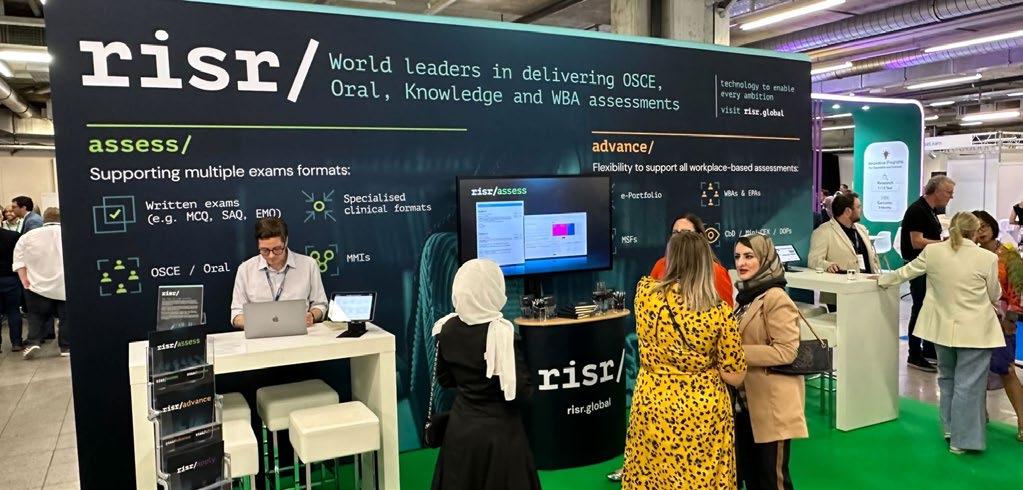
June 11-12: eAA, London
May 16: Memberwise in London
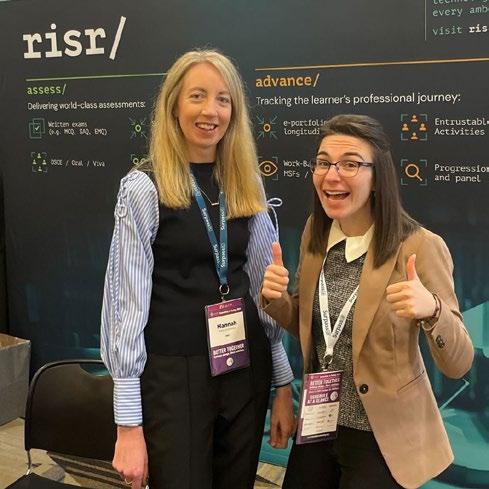
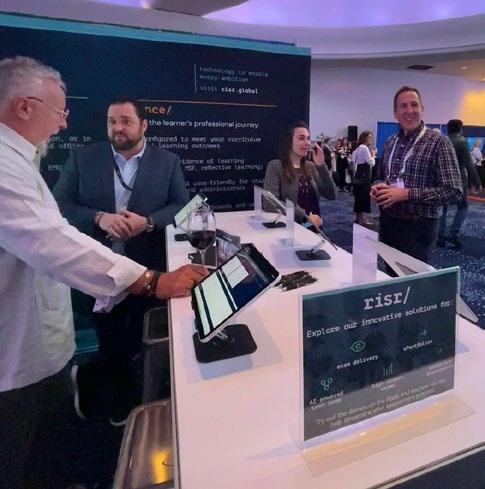

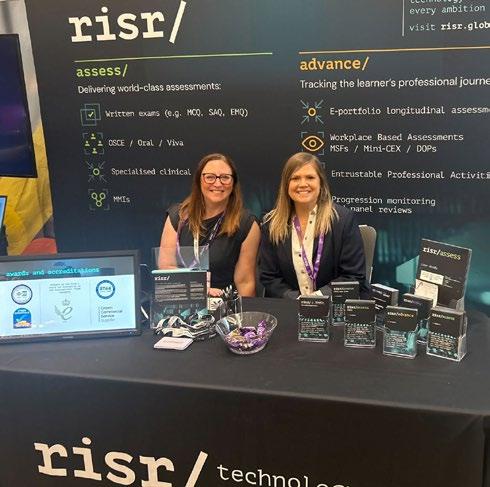
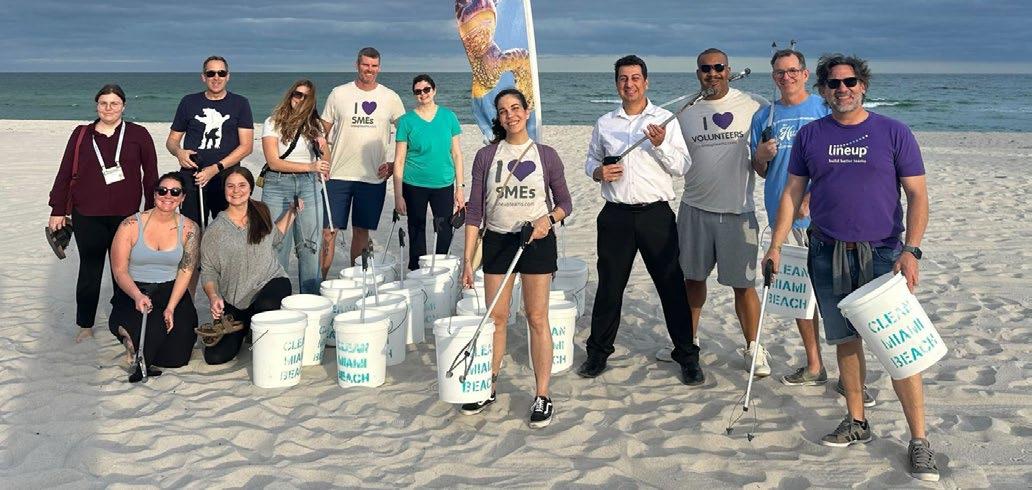


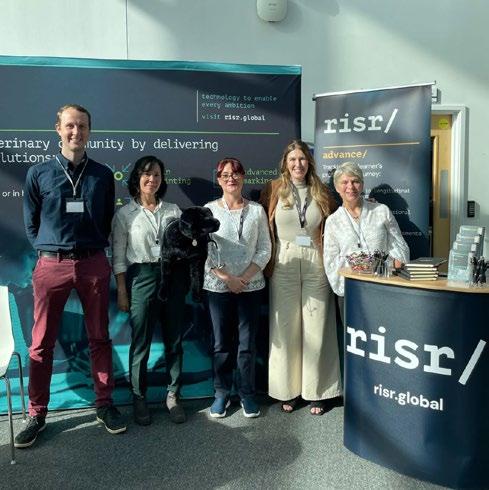
July 1-4: ANZAHPE in Queensland, Australia
September 19: EPA 2024 in Birmingham
August 24-28: AMEE in Basel, Switzerland
July 3-5: VetEd in Dublin
October 23-26: E-ATP 2024 in Berlin
October 11: Construction Awards
September 22-25: IAEA Conference in Philadelphia
August 28-30: InVeST in Surrey
November 17-20: ICE 2024 in Miami Beach 2025
November 8-12: AAMC Learn, Serve, Lead in Atlanta
October 16: Conference on Test Security (COTS) in Salt Lake City
November 25-26: FAB 2024 in Leicester
In 2025, risr/ is excited to continue exhibiting and attending events worldwide! Be sure to keep an eye on our LinkedIn page to see where we’re traveling to next, and of course, be sure to say hello if you see at your next event!
In today’s competitive landscape, our customers face high-pressure workloads managing assessments. We provide modular managed services in North America, delivered by our team of experts, enabling organisations to streamline operations, reduce risks, and ensure seamless exam logistics, delivering benefits beyond operational support and making assessments smoother and more manageable.
How our managed services can support you
Focus on what matters: Let us take care of the details so you can concentrate on your priorities and goals.
Save time and money: Outsource exam management to reduce costs and free up your team’s resources.
Experienced support: Our attention to detail ensures exams run smoothly, building trust and confidence in the process.
Flexible to your needs: Whether it’s a small test or a nationwide programme, we adapt to fit your requirements.
Simpler coordination: From scheduling to delivery, we make exam logistics easier and hassle-free.
Modular Managed Services when you need them: Access options like remote proctoring and test centre support to meet your unique needs.
Working together: We’re here to handle the hard parts, so you can focus on achieving success and delivering a great experience.
For more information please contact your account manager
www.skilltechsolutions.co.uk

In 2024 we teamed up with Skilltech Solutions, a leader in EPA management, to create an all-in-one digital platform designed to streamline assessment processes for apprentices, learners, administrators, and assessors.
every ambition
Industry-leading assessment technology integrated seamlessly into your EPA management hub.
By integrating our expertise in assessment delivery with Skilltech’s robust EPA management platform, EpaPRO, we’re delivering a unified solution that maximises value for EPA organisations (EPAOs). The risr/assess platform now powers EpaPRO, which is widely used by leading UK EPAOs. This new collaboration allows EpaPRO customers to seamlessly design and conduct assessments in a variety of digital formats directly from a single system, while also managing administrative workflows such as registrations, gateway, scheduling, and feedback.
Our technology offers EPAOs unprecedented flexibility, supporting oral, knowledge, and practical assessments in-person, digitally, or in a blended format. For assessors, our platform enables conducting assessments online or offline, marking on mobile devices, and capturing evidence and observations on the go. The data synchronises instantly or when the device is next online—an industryfirst for the EPA market. For apprentices, the platform offers a consistent and accessible experience across all required assessment types, simplifying the process significantly. With risr/ now powering EpaPRO, EPAOs can achieve a level of quality assurance and
consistency that was previously unattainable, overcoming the challenges of managing multiple systems to assess Knowledge, Behaviours, and Skills (KSBs). Our solution has already been proven in real-world settings, such as with Construction EPA, where it’s used to assess apprentices across 25 standards, accommodating diverse needs like dyslexia or visual impairments.
Ian Jarvis, Managing Director of Skilltech Solutions, shared, “For years, we envisioned an EPA platform where everything from start to finish could happen seamlessly. risr/ provides the e-assessment solution that finally meets this vision. Together, we’re delivering a service that improves assessment quality, reduces administrative overhead, and enhances the experience for all.”


In March 2024, we had the pleasure of sitting down with Caroline Mosley, a passionate Lecturer in Veterinary Clinical Skills at the University of Edinburgh, to explore her experience with the risr/assess OSCE solution.
The School was looking for specific OSCE software to enhance the reliability and validity of its assessment, after recognising that a paper-based approach was becoming increasingly arduous to manage.
The School previously printed off almost 2000 sheets of paper per round of OSCEs!
Not only was this incredibly time-consuming to ratify marks, but it was also difficult to communicate any changes to mark sheets, requiring manual intervention to avoid any subsequent discrepancies in assessment.
Enter risr/. We came recommended as a tried, tested and trusted partner, as Edinburgh University’s Medical School already used risr/assess for its practical exams. The risk of missing papers has been eliminated and the margin of error massively reduced.
The Veterinary School is using the risr/ assess software for in-person observed assessments in its testing centre, with examiners marking candidates on iPads.
The School uses the software to facilitate OSCE exams for nearly 400 students p/a across year two, GEP, and final-year students. The standardised mark sheet can be managed asynchronously, and the

auto-fail feature allows critical fails to be implemented and override the rest of the exam results. Additionally, the school utilises the online marking version of the system to allow students to complete video tasks that can be submitted for later review.
“All the examiners who have ever used risr/assess say they love it, and they have all come to me and said it was so easy’.
Reliability and functionality are key. risr/ assess can run offline, so if the Wi-Fi system drops off mid-exam, it’s not a problem, and a member of the risr/ team is always waiting in the wings during live exams if any other issues occur.
The School’s examiners also value how easy the platform is to use, with the ability to save, and go back in and edit if necessary. They open risr/assess and are presented with students’ assessments in the order they’re entering the station, making the entire process seamless from start to finish.
top features and benefits identified by the university features:

Enable auto-fail to override exam results for critical fails
Continue the exam even if the WiFi drops advanced asynchronous marking
A practical solution for remote marking
Avoid days of exam ratification with automatically generated results on and offline capability
“Before risr/assess, it took four of us four days to ratify OSCE marks on paper. This has now been eliminated and we have never had a blip during an exam”
Caroline Mosley, Lecturer in Veterinary Clinical Skills, The University of Edinburgh

Straightforward and intuitive to use
Locate and track students instantly simplicity for examiners

reduce admin
Alleviate the paper burden with digital processes
The ability to mark sheets at a later date

Streamline your assessment process with risr/’s one-platform solution for managing every stage of your assessments. From application to results, risr/ integrates powerful modules like /apply and /advance to simplify workflows, enhance efficiency, and provide valuable insights—all in one seamless solution.
Coming soon. Recruit and manage availability of examiners across your exams
Auto-schedule exams and courses with a simplified booking process
risr/apply
Automatically handle payments and refund
Author, review, and approve assessments and dashboards asynchronously
risr/assess
Deliver knowledge, oral and practical assessments remotely, onsite or in a hybrid format
Easy self-service system which guides users through the booking and payment of eligible exams and events registrations: Register your students, members, candidates, examiners
Ensure consistency and validity through robust systems and a range of assessment options

Automatically analyse and process results and feedback to students and assessors
Alleviate the administrative burden and cost with automated processes and real-time insights
Monitor progress over time and set goals collaboratively
Gather your workplace assessments and EPAs in one place, supporting with the risr/ AI form assistant to streamline evidence gathering and assessor time support improvement
Encourage reflective practice and provide personalised learning pathways
A complete platform for supporting professional development with an up-to-date view of progress, and automated workflows all in one place

Lilli Trautvetter, Project Manager for the Fistula Surgery Training Initiative at the International Federation of Gynecology and Obstetrics (FIGO), joined Dannielle Murphy this year to share how the risr/ advance module plays a vital role in supporting their mission.
FIGO is a global professional membership organisation focused on women’s health and wellbeing globally. It aims to reduce disparities in healthcare and advance the practice of obstetrics and gynaecology worldwide.
FIGO uses risr/advance to help build the capacities of trainee fistula surgeons to provide treatment for women suffering from obstetric fistula. The condition affects two million women in 60 low-resource countries of sub-Saharan Africa and certain parts of Asia, with up to 100,000 additional women developing a fistula every year in some of the world’s poorest and most disadvantaged communities.

Dannielle
Murphy Customer and Relationship Manager

Key features for FIGO
• Adaptable for bilingual audiences
• Suitable for ‘low resource’ areas with poor WIFI
• Accessible and user friendly
• Efficient for users
• Central bank to collate feedback


What prompted FIGO’s decision to begin working with risr/ back in 2016?
With such a specific use-case – to help our local trainee fistula surgeons to better collate evidence of their extensive training and CPD logs – the risr/advance platform was the dominant option on the market which met our specific needs.
It made the task of digitising a lot of our paper-based programmes much easier, and given our purpose of developing global advocacy for obstetrics and gynaecology, the ability of risr/advance to provide a consistent level of service across borders and regions that can be hard to access digitally was really impactful for us.
What’s the main use case of risr/advance for your members?
We use risr/advance as the main monitoring and evaluation component of our core training initiative. This means we use three main forms. One of which is the quarterly data collection, that all of the surgeons who have undergone training complete every quarter for as long as they are on the programme, and the other two are assessment forms to capture feedback for the training sessions of both the trainer and trainee.

Across the regions we operate in, we have regular users operating out of sub-Saharan Africa and SE Asia – many are based in ‘low-resource settings’, so have bad internet access and often competing priorities, given their roles as Heads of Department, or similar.
This means we have to make our dashboard and training logs really accessible, so as to encourage our members to update them as regularly as they can. We’ve made our dashboard and forms on risr/advance bilingual too, to make this process a bit easier.
A key part of our use of risr/advance is its data collection abilities. We’re able to collect feedback and act as a resource hub for experienced surgeons to report on the number of fistula surgeries they do. As of July 2024, many surgeons from 27 affected countries have collectively provided over 21,000 fistula repair operations! This is partly made possible by the existence of this central bank of feedback, allowing for better training of more surgeons and teams so that more women can be treated in the future.
Working with such an internationally diverse body of members, it’s vital to us that we’re able to cut through the noise to update our resources and deliver key information more quickly. The function to report more precisely and clearly through risr/advance is vital to that. This is quite a straightforward application of the software, so we’re keen to further tap into the potential of what risr/advance can deliver, which is why we’re training more members of our team to understand its capabilities.
It’s estimated that 2 million women live with an obstetric fistula worldwide. Especially in SE Asia and sub-Saharan Africa, there is finite resource to address this. Our programme aims to standardise training so we can close this gap, whilst developing the competencies of surgeons who want to learn.
Obstetric fistula will always exist unfortunately. But with risr/advance, we can collect repair data, understand other associated repairs better and more clearly see if our work is having its intended impact. We’re then able to report back to our donors how much of an impact our work is having, subsequently improving the training experience for our trainee surgeons.
For more information on risr/advance please visit www.risr.global or contact Dannielle@risr.global

risr/labs is a new feature launchpad to support the rollout of features on the risr/platform.
Instead of automatically including new functionality in updates, /labs puts you in control. You can choose to turn features on or off whenever it works best for you—or not use them at all if they’re not relevant to your needs.
Additionally, the launchpad can be used in both your test and live environments, giving you the flexibility to experiment and test within your unique set-up. The release cycles will continue as usual, and you will receive notifications at the scheduled release times as normal.


risr/labs is available across all of our modules: risr/assess, risr/advance and risr/apply.
risr/assess
If you have the “manage access” permission for /assess, /labs will be available on “Settings” tab on the top ribbon on your test and live sites.
risr/advance and risr/apply
If you’re a org administrator for /advance, / labs will be available on “Settings” tab on the top ribbon in your sandbox environment and on the live platform.
AI Item Set Generator
Available now on risr/assess versions 8.12 and above
This powerful tool creates tailored, high-quality exam or assessment questions. It works with content provided by item writers, ensuring the questions align with your educational goals. Find out more about the benefits in our support materials.
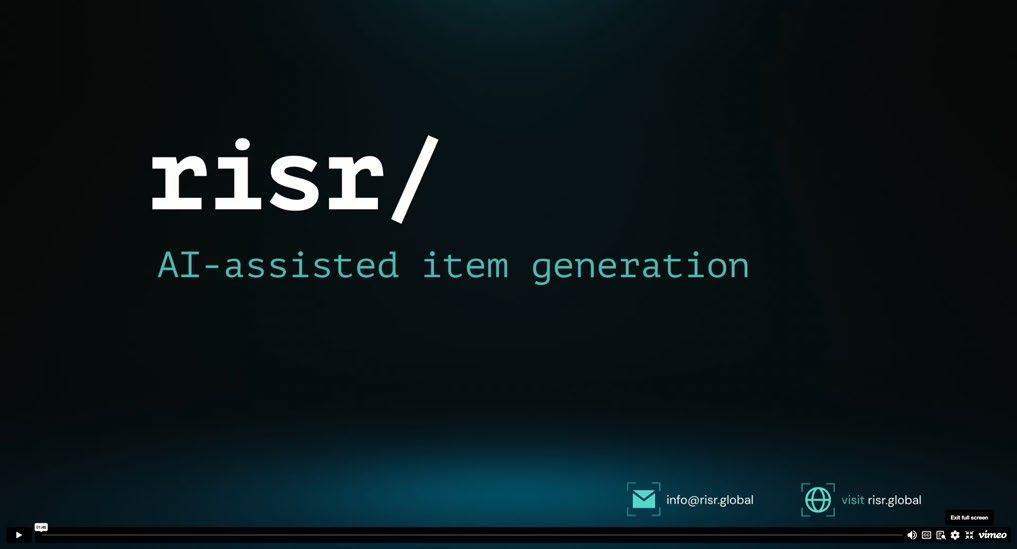
AI Form Assistant
Available on risr/advance
Accurately capture the details of a conversation to create an unbiased record— fully adjustable by both participants. Significantly reduce admin effort and streamline the process.
More information on implementation and uses is available in our support materials.
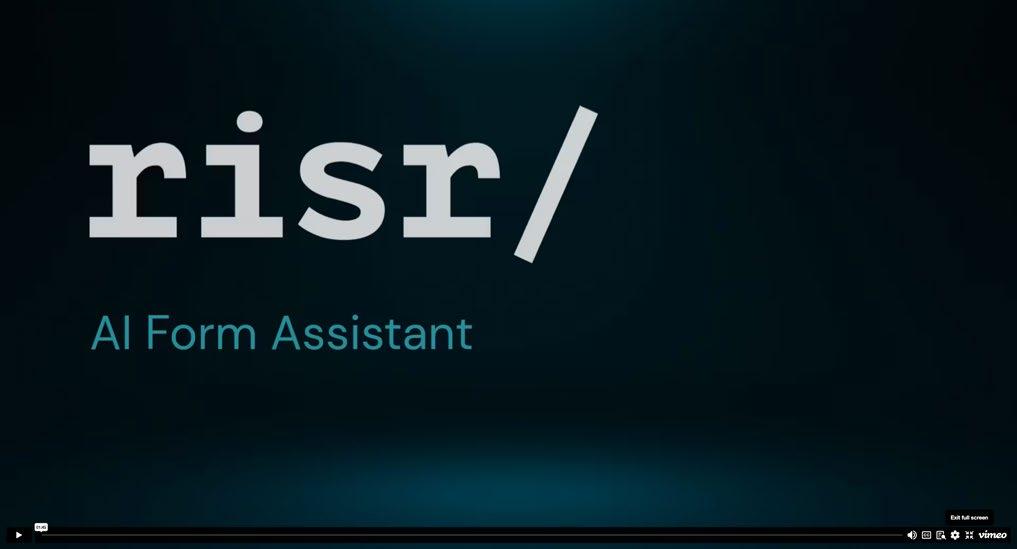
These new AI features are currently included in your license at no additional cost. In the future, advanced or enhanced features may be offered under different pricing options. We’ll keep you updated with any changes.
We hope you find these new features as exciting as we do and they add value to your work, if you have any feedback please complete the form in the support hub.
If you would like a demo, please contact your account manager
We’ve listened to your feedback about needing more opportunities to connect with fellow users and stay updated on our latest developments. That’s why we’re excited to introduce a suite of risr/ events coming your way in 2025! More events will be added throughout the year, so please keep an eye out for updates.
Webinar:
Is using VR and AI the future of practical assessment?
To request the recording please contact vic@risr.global
We’re joined by Jeremy Carter from Sentira for a live demo showcasing how virtual reality (VR) and AI are transforming practical assessments. Discover how these technologies break barriers, enabling world-class assessments at scale—without the logistical and financial challenges of inperson delivery.
In this session, we’ll:
• Explore current challenges in practical assessments.
• Learn how VR and AI can deliver scalable, effective solutions.
• Address concerns about technology in assessments and how to overcome them.
• See a real-world example of VR and AI in action.
• Experience the future of practical assessment and see how technology unlocks new opportunities for true-tolife, scalable evaluation.
Module showcase:
How to use the apply module to simplify your processes
4 March / 14:00 GMT / 30 minute session Online / Register to attend
Administrative tasks are often timeconsuming and challenging, particularly when supporting students while managing exams, training, events, and memberships. The risr/apply module is designed to alleviate these burdens, streamlining the setup, application, and payment processes— all within the risr/ platform.
Join us for this information session to explore the key features of risr/apply and how it can enhance efficiency, save time, and simplify administrative workflows.
5 March / 14:00 GMT / 30 minute session
Online / Register to attend
AI is revolutionising education, assessment, and apprenticeships, offering opportunities for greater efficiency, personalisation, and fairness. However, its successful integration requires addressing challenges like ethics, data privacy, and the need for human oversight – the “human in the loop.”
Join leading experts to explore how organisations can design AI-driven solutions that balance innovation with human insight, shaping the future of education and apprenticeships.
Community event:
risr/connect - network with fellow users
6 March / 14:00 GMT / 45 minute session
Online / Register to attend
Introducing risr/ connect – a brand-new online initiative for 2025 inspired by your feedback. This 45-minute quick-fire session is designed to help you connect with fellow risr/ users in an informal and friendly environment.
What to expect:
• Three 10-minute discussion rounds on key topics of the day.
• Attendees will be grouped with people they haven’t met before in each round.
• No presentations – this session will be completely led by you.
This is a trial event, and if we reach 30 sign-ups, we’ll move ahead. If you are interested in attending but the date isn’t convenient, please register your interest with Dannielle@risr.global.
Community event:
risr/ community day - in person
10 October / 10:00 - 16:00 GMT
In-person / Central London / Register your interest
Building on the success of the 2024 risr/assess Community Day, we are thrilled to announce an even bigger and better community event for 2025! Open to all module users, this exciting gathering will feature:
• Networking opportunities to connect, collaborate, and share insights with fellow attendees.
• Updates on our latest product developments, keeping you at the forefront of innovation.
• Engaging discussions and sessions tackling the key topics shaping our community.
The full programme will be unveiled in March 2025, and we can’t wait to welcome you. Please note places are limited, and while we gauge your interest, we are limiting places to two attendees per organisation.
If you have any suggestions on content or themes you’d like to explore, please complete our short form
Dr. Julie Dickson, Senior Lecturer in Veterinary Integrated Structure and Function at the University of Bristol’s Veterinary School, highlights the transformative potential of this risr/’s ‘game-changing’ technology.
Since going live with risr/assess, Bristol Veterinary School has seen improvement at each stage of the OSCE process. The following features have been most beneficial:
features:

Audit trail of OSCE documents
Generate candidate and examiner feedback at a click of a button
benefits:
tagging functionality
Easily create marksheets according to programme/year of study
Avoid days of exam ratification with automatically generated results secure, centralised database
Handle different OSCE examinations in one place simplicity for examiners
Straightforward and intuitive to use
Alleviate the paper burden with digital processes all-in-one
Process marks quickly for highvolume of candidates reduce admin


Bristol Veterinary School required a digital solution to help streamline its assessment process and reduce the time spent on manual data entry, collation and processing. Bristol’s former exam setup process took up to 96 hours, not including delivery and reporting, and was entirely paper-based. Bristol also wanted to future proof its processes to support expected increases in cohort sizes. The School was introduced to risr/assess through Bristol’s Medical School (also a risr/assess client) and was impressed by the breadth and flexibility of features on offer.
Since going live with risr/assess, the Vet School has seen improvements in every stage of the OSCE process. The features it finds most beneficial include:
- Using marksheet criteria tagging to help with standard setting and to designate marking criteria to particular OSCEs with ease.
- Automated candidate feedback - generating results and distributing to 200+ candidates with minimal manual intervention.
- Being able to use marksheets while offline. The School uses multiple sites as OSCE stations, including equine stables where WiFi connection can be unstable.
The Veterinary School describes risr/assess as a “game changer” due to the impact the software has made:
- Reduced exam processing time by at least 50%, meaning students receive results much faster
- Streamlined OSCE management within one system
- Automation means that human error margin is limited
- Ability to effortlessly keep pace with growing demand
- Provides flexibility for future development of OSCE assessments.
“risr/assess, has massively streamlined our assessment process and reduced the amount of time that typically goes into OSCE creation, delivery, analysis and reporting. Feedback from staff has been overwhelmingly positive about how slick, simple and intuitive the software is.”
Dr Julie Dickson, Senior Lecturer in Veterinary Integrated Structure at the University of Bristol Veterinary School



Tad Chapman, Vocational education solutions lead
How AI could make a significant difference to a strained end-point assessment system (and why it’s no panacaea)
The longstanding challenge for the end-point assessment (EPA) sector has been reconciling the rising demand for assessments with a limited ability to scale in parallel – leading to strain and pressure on the EPA system.
So, as we look ahead to what 2024 will bring, I expect this need for greater efficiency will remain a key issue for the sector to try and address.
Ofqual’s latest data on the recent growth in the number of apprenticeship completions highlights that from 2020/21 to 2022/23, the number of EPAs completed increased from 13,405 to over 110,000.
To compound matters further, the next 12 months will also see a number of reviews to existing apprenticeship standards which could bring significant change to assessment plans. This could result in huge operational impact for end-point assessment organisations (EPAOs) in terms of how these changes are delivered.
So, if EPAOs are to stay ahead of the game in 2024, it’s crucial that they remain cognisant of ‘emerging’ technologies, ones that can make a marked improvement to the efficient delivery of end-point assessments.
Artificial Intelligence (AI) is one huge area of opportunity here. Within vocational education, discussions on AI have largely focussed on concern around the prevention of cheating, with a small acknowledgement that AI may
be able to primarily assist training providers, rather than EPAOs. But I believe there’s a vast range of other useful applications that are yet to be explored for EPAOs.
A significant boost to efficiency that would be impossible to ignore would be the use of Large Language Models (LLMs) to generate question banks based on inputted occupational standards. These LLMs could be embedded within the question authoring system, providing the ability for the requisite assessment information to be fed in without user intervention – in a similar way to how APIs work. As a result, this could save EPAOs significant time and cost on question writers, with experts able to refine questions rather than create them.
Another huge efficiency boost for the EPA sector would be the exploration of AI for boosting the productivity of administrators.
If this came to fruition, we could see a huge reduction in the cost and logistical planning hurdles that are often associated with EPA. For instance, AI could be used to coordinate diaries of the candidate and assessor via an online booking platform, meaning candidates could book in and take their exam sooner.
Oral assessments represent another area that can benefit from an infusion of AI. As speechto-text technology improves, the recording of the assessment could be directly inputted into an LLM, transcribed, and then compared against a marking rubric.
For more information please visit risr.global/apprenticeships

It means a live human assessor could have a first draft of a mark done almost immediately and wouldn’t need to spend hours revisiting transcripts or recordings. Of course, it still needs to be checked by human intelligence, but this would be significantly more efficient and would increase the capacity of an assessor to deliver more assessments, as well as providing more standardised, consistent assessment decisions.
These three AI developments are just the tip of the iceberg when it comes to possible improvements that AI can make to the operations of EPAOs.


Critically, this isn’t to say AI is the panacea to the issues the EPA sector is facing: human intelligence remains the key driver to success. Rather, it’s to point out that we, as an industry, have the ability to drastically improve the efficiency of how we work, and AI could be an incredibly valuable ‘co-pilot’ in providing solutions to the widespread issues facing the EPA sector.
The common issue I’ve come across to date is that EPAs perhaps don’t have the resource to fully explore where they can utilise AI, which brings us back to the overarching issue: resolving challenges in the EPA space requires continuous innovation and development. In 2024 and beyond, edtech providers must continue to prioritise solutions that deliver measurable and tangible impact for the sector.


We take compliance seriously. We’re proud to adhere to the highest industry standards, ensuring our partners can trust us when delivering secure, reliable, and efficient exams and assessments.
risr/ follows industry-standard security guidelines and practices, so you can focus on what matters most: empowering learners and improving outcomes.
